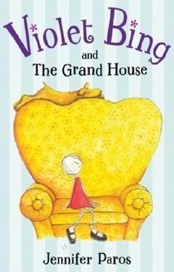The Blitz: On Feeling Overwhelmed, Seeking and Finding Safety
by Jennifer Paros
“When jarred, unavoidably, by circumstance, revert at once to yourself and don’t lose the rhythm more than you can help. You’ll have a better grasp of harmony if you keep going back to it.”
At 85, my father went through a brief period in which he was in and out of hospitals. There was a lot of communication between family members regarding what did – or didn’t – need to be done. I found myself mentally on call, though most of the time I was unneeded. The business of waiting for news that I would have to do something put me into a state of hyper alertness more stressful than any event that occurred during that time. I was in mental overdrive. My focus was fixated on a future over which I had no control and on living up to responsibilities I could not yet define. I was overwhelmed – not from what was happening, but by the idea of what might happen.
During World War II, the Nazis developed the Blitzkrieg – in which columns of tanks rushed into Poland, the Netherlands, Belgium, and France. As Ryan Holiday says in his book, The Obstacle Is the Way, the Blitzkrieg was constructed to capitalize on the enemy flinching when faced with what seemed to be an “overwhelming force.” The enemy had to fall apart, otherwise the Blitzkrieg strategy wouldn’t work. It was Dwight D. Eisenhower who demanded his generals no longer see the situation as a disaster. He envisioned taking advantage of the onslaught of Germans, rather than recoiling. They would bend, not break, in the face of the upset. Holiday says the Allies were “. . . able to see the opportunity inside the obstacle rather than simply the obstacle that threatened them.” This new perception helped change the course of the battles to follow.
When we feel threatened, the perceived threat can become hypnotizing and leave us suspended in a sense of urgency, placing our attention almost completely on outcomes rather than actively engaged with the process. And there is no safer feeling than being focused on what we can do and create in this moment.
“Perhaps I am stronger than I think.”
When life seems to bombard us, it’s hard to believe it’s not our job to try and hit back at everything that arrives on our side of the net. But the valuable thing about feeling overwhelmed is that when things are “too much,” it encourages us to stop looking for reassurance externally, and start finding our equanimity within. Knowing how to break the cycle of observing and just coping is a valuable skill. There is no thriving to be found in monitoring and managing, but there is stress. We often think hyper vigilance and management is the strategy but, in truth, it serves as more of a ritual offering the illusion of control than an effective, sustainable path forward. There is rest for the weary, but it does not exist in the world. The eye of the storm, so to speak, is in each of us.
After the birth of my youngest son, due to complications, I lost almost half my blood. In the hospital, nurses were monitoring my temperature, blood pressure, heart, and taking regular blood draws, amongst other things – even waking me during the night to do so. Due to my very low hematocrit, I was warned I might have to have a blood transfusion. Exhausted from the birth, weak from the blood loss, wanting to connect with my new baby, the more they monitored me, the more stressed and fearful I felt. It was only when I turned my attention inward, away from the drama, that I could find calm and was inspired to take new action and ask new questions. My mind opened, my perception shifted, and my life was no longer something happening to me but once again my own.
There is power in taking a break from life’s stories and momentarily returning to the interior of our experience. There is a sweet spot, a focus within where our minds open. And when we pause there – with that inquisitive mind – we attract answers. It’s what writer and teacher Byron Katie describes as “I know; I don’t know” – where in acknowledging how both are true, we rest in a receptive state. An open mind is ready for the answers a closed mind is unable perceive. Now we are bendable, not breakable, no longer overwhelmed. We can see the opportunity in the moment – and see our way forward.
Jennifer Paros is a writer, illustrator, and author of Violet Bing and the Grand House (Viking, 2007). She lives in Seattle. Please visit her website.

